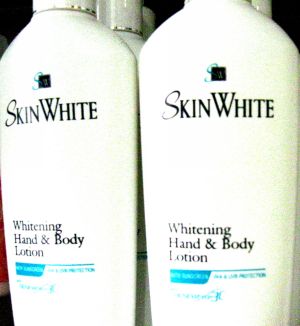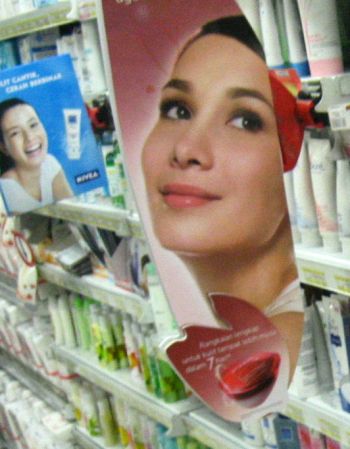Tessa Toumbourou
White faces dominate the supermarket shelvesTessa Toumbourou |
Faces so white they are nearly transparent stare vacantly from the sides of hundreds of varieties of creams, lotions, soaps, scrubs and bleaches in supermarket beauty aisles across Indonesia. Those same faces stare out from advertisements in magazines, on billboards, on the sides of buses and on television – all proclaiming the benefits of lighter coloured skin.
Promotions for skin whitening products are targeted squarely at Indonesia’s urban aspirational classes. Young university women represent a key market segment. Advertisements portray the kinds of lives they aspire to and free samples are handed out at universities. Many university-aged women believe that regular use of skin whitening products makes them more attractive. But not all are enthusiastic. Some women are concerned about potentially damaging side effects of the products themselves. Many more reject the industry’s message that women can’t succeed in their careers or their love lives without altering their physical image.
Mixed motivations
The skin whitening phenomenon in Indonesia is part of a billion dollar Asia-wide industry that pressures women to respond to the siren call of white skin. In Indonesia, pale skin is promoted as a key opportunity enhancer – a social indicator of status, power, wealth, and most emphatically, beauty. The message is clear. Dark skin is inferior and somehow dirty, ugly, or even unhealthy. As one university student commented, ‘Beauty for Indonesian women is defined as a woman whose skin in white.’
When asked to define the consumer market for skin whitening, university students I spoke to described the majority of users as teenagers and young women aged between 15 and 25. Laughing, a pair of English language students explained that skin whitening products are used by teenage girls to attract boys’ attention. ‘They do it so they have brighter looking faces, like in advertisements of pretty teenagers and women who use skin whitening.’ Students also mentioned the growing use of skin whitening by older women as a form of anti-aging therapy.
Many university-aged women believe that regular use of skin whitening products makes them more attractive.
There are many other reasons why young women choose to use skin whitening products. Some students put it down to personality. But the push for whiteness is also structural. Many women pointed to pressures in the job market, and the prospect of appearing more attractive to prospective partners. Others blamed the growing influence of western culture for pressuring people to become white. One student suggested that the push to use whitening products was a form of cultural cringe, which ‘reduces the value of our own skin’. This was echoed by another student who observed that ‘Our own community does not consider our own culture to be important, so we think the same of ourselves.’
A dangerous habit
Even those young people who embrace skin whitening have concerns about its long-term effects. Most skin whitening products contain mercury or hydroquinone, two seriously damaging chemicals. Mercury, a common ingredient in skin whitening creams in Asia, strips the skin of its natural pigment. It is also a poison known to cause liver and kidney damage, which can also lead to neurological disorders. Hydroquinone, a chemical used in photo processing, has been shown to cause cancer in lab animals. Ironically, both chemicals also react with ultra-violet rays and re-oxidise, leading to more skin-darkening pigmentation and premature aging. More of the product is then needed to alter the response, which changes the skin’s natural structure and inhibits the production of melatonin, making the skin more susceptible to skin cancer.
 |
One of the hundreds of skin-whitening products on sale inIndonesiaTessa Toumbourou |
Some young women are acutely aware of the risks and side-effects of skin whitening products. According to one sceptical student, the skin whitening process is on the whole ineffective. ‘I think it doesn’t work to make you white, it’s just lies. But if whiteness results, it is because of the mercury or other dangerous substances.’ Many students also discussed their concern for the side- or after- effects of skin whitening products, mentioning their concern for flecking, reddening and the possibility of faster aging and cancer. Some also mentioned a potentially addictive pattern of skin whitening product use – the product makes the skin more sensitive to the sun and therefore more likely to darken, actually increasing the need for more whitening.
Although not everyone is as conversant of the dangers involved in skin whitening, most are at least partially aware of the risks. Some young women are convinced that it is still worthwhile, but many others are not. As one woman observed wryly, ‘It depends on the person, if they consider their appearance to be number one, the most important.’
Skin whitening sceptics
Despite pressures to engage in skin whitening reiterated in media and advertising, the majority of Indonesian students I interviewed were sceptical about claims that lighter skin is necessarily better, more attractive, or guarantees success. As one woman observed, ‘Although appearance does have a place, I think that when we are ourselves, appearance is not as important.’
Some students rejected outright the notion that whiteness defines beauty, arguing that white skin simply looks unhealthy. Others claimed that the relationship between success and appearance was limited to particular fields of work where success is dependent on aesthetic appearance, such as the film and music industry, or product marketing. In other jobs, they argue, ‘Success is earned through hard work.’
Some students rejected outright the notion that whiteness defines beauty.
Many of these young women believe that deep down, a heavy reliance on skin whitening products actually reflects a lack of self-confidence. In the words of one undergraduate, ‘Maybe for people who don’t believe in themselves their appearance is their own measure of self.’
Many of these educated women were certainly critical of the commercial pressures to lighten skin, asserting that a strong sense of self can overcome the need to rely on aesthetic appearance. This comes down to accepting and embracing one’s own self, whatever one’s skin tone, as natural and true. As one student commented, with a shrug, ‘It is better to just keep the colour you have…if your skin is yellow, leave it yellow.’ ii
Tessa Toumbourou (tdtou1@student.monash.edu.au) is an Arts graduate with a politics major. She recently completed a Diploma of Indonesian Language in-country at Universitas Gadjah Mada, Yogyakarta, and will continue living in Yogya on a Darmasiswa scholarship studying at Indonesian College of Arts (ISI).
